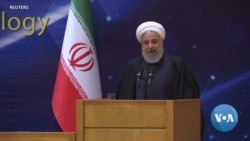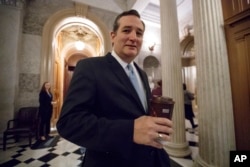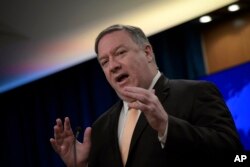The United States is ending its sanctions waivers for five countries importing Iranian oil, hoping to put new pressure on Tehran to curb its military aggression in the Mideast by cutting off its main source of national revenue.
The decision "is intended to bring Iranian oil exports to zero, denying the regime its principal source of revenue," said the White House in a Monday announcement.
The waivers will end, effective May 2, for three allies — Japan, South Korea and Turkey — as well as China and India. Additionally Italy, Greece and Taiwan had already acceded to U.S. demands to end their purchases of Iranian oil.
On Twitter Monday, President Donald Trump said Saudi Arabia and other countries in the Organization of the Petroleum Exporting Countries (OPEC) cartel "will more than make up the Oil Flow difference in our now Full Sanctions on Iranian Oil."
Iran on Monday threatened to block the Strait of Hormuz, a strategically important chokepoint, if it is prevented from using it, an apparent direct response to the announcement from Washington.
A senior Trump administration official responded that there is "absolutely no justification for Iran to close the strait. It's typical of their behavior."
The official, speaking to a group of reporters on condition of not being named, said the United States will now look for ways to cut off Iranian attempts to evade the sanctions — a move that could further escalate already significant tensions between Tehran and Washington.
"We're going to watch where they go, no matter what," the official said of ships carrying Iranian oil.
WATCH: US, Iran relations
Saudi Arabia and the United Arab Emirates "have agreed to take timely action to assure that global demand is met, as all Iranian oil is removed from the market," by increasing their oil production, according to a White House statement.
The oil industry database TankerTrackers.com says complete removal of waivers is likely to curb Iran's exports to below 1 million barrels a day, down from 1.9 million in March.
Saudi Arabia "will coordinate with fellow oil producers to ensure adequate supplies are available to consumers while ensuring the global oil market does not go out of balance," according to the kingdom's energy minister, Khalid a-Falih.
As news of the end of the sanctions waivers first surfaced on Sunday, the price for the international benchmark Brent Crude spiked to a new high for the year (and was trading Monday around $74.50 a barrel, an increase of about 2.5%).
The ending of the waivers will not create a need for the United States to tap its Strategic Petroleum Reserve, in part due to robust domestic production, according to the senior administration official.
Sen. Ted Cruz, a Republican from the key oil state of Texas, is hailing the decision because it "will deprive the ayatollahs of billions of dollars that they have spent undermining the security of the United States and our allies, building up Iran's nuclear and ballistic missile programs and financing global terrorism."
Turkey's foreign minister sees it differently.
In a tweet, Mevlut Cavusoglu predicted the U.S. decision "will not service regional peace and stability" and will harm the Iranian people.
Turkey "rejects unilateral sanctions and impositions on how to conduct relations with neighbors," the foreign minister added.
Other countries affected, such as India and Japan, have continued purchases of Iranian oil, in part to maintain a geostrategic balance and not be viewed as too beholden to the United States.
Those countries were not caught unaware by Trump's decision, said the official in response to a VOA question on how counterparts in New Delhi and Tokyo reacted to the advance notice from Washington.
"No change in policy is ever friction free," added the official.
Shortly after Monday's White House announcement, Secretary of State Mike Pompeo told reporters that by ending the sanctions waivers, the U.S. has "made clear our seriousness of purpose."
The top U.S. diplomat said the U.S. is "happy to re-engage with Iran as a normal nation" once it ends pursuit of nuclear weapons, missile testing and fostering terrorism.
Pompeo said the "expeditionary nature of the Iranian government threatens people throughout the world."
Pompeo said Iran has been generating more than $50 billion a year in revenue before the sanctions went into effect.
The end of the waivers could affect the gross national product of Iran, whose economy is already under enormous pressure, a senior administration official predicts.
"That is part of the maximum pressure campaign," the official added.
Trump reimposed sanctions on Iran last year after he abandoned the 2015 international agreement that gave Iran sanctions relief in exchange for limiting its nuclear activity.
The U.S. sanctions are meant to pressure Tehran to change what the administration calls Iran's "malign activities," including its support of Syrian President Bashar al-Assad and Houthi rebels in Yemen.
China opposes U.S. imposition of "unilateral sanctions and long-arm jurisdiction," and that China's business with Iranian companies is transparent and legal, Foreign Ministry spokesman Geng Shuang in Beijing told reporters on Monday.
While the United States has withdrawn from the 2015 Iran nuclear deal, Iran and the other signatories — Britain, China, France, Russia and Germany — have said they remain committed to carrying out the agreement.
The International Atomic Energy Agency is in charge of monitoring Iran's compliance, with terms such as limiting the number of centrifuges in operation at its nuclear facilities and abiding by caps on its stock of enriched uranium. In multiple reports, the IAEA says Iran is abiding by the deal.











